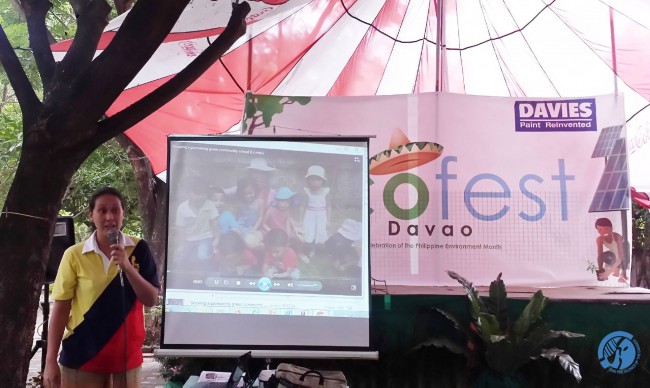Representatives of various pro-environmental groups gathered at People’s Park last June 29 to discuss how to attain achievable sustainability without compromising development.
The discussions called “Lunhaw Conversations” emphasized on the importance of the environment and how it is essential to urbanized cities such as Davao City.
Maya Vandenbroeck, a teacher from Tuburan Institute, was the first speaker of the event. According to her, Tuburan Institute, Inc. is a Steiner-Waldorf inspired school located at Barangay Indangan, Buhangin District, Davao City.
Maya Vandenbroeck, a teacher from Tuburan Institute, said that their school was inspired by the Steiner-Waldorf educational theory, which states that children from a young age should be taught using physical immersions and hands-on activities.
During her discussion, Vandebroeck shared how the application of the theory to the school’s environment-centered curriculum had helped the institute’s pupils to learn how to value and care for the environment.
She also stressed that the institute’s infrastructure is made of concrete and natural materials and that the food they serve to their students was grown by them in their gardens.
Arch. Jim Palma, an associate of Save Shrine Hills, discussed that the said hills are cracking due to urbanized developments such as building of subdivisions. As a result, soil eroded and water regulation became unstable.
Palma also exlained that turning Shrine Hills into an ecological park has both environmental and economic benefits.
Dr. Corazon Dela Torre from Davao Doctors College shared the school’s process of hazardous chemical waste management.
She emphasized how the school treats the waste used by the students, how they are stored, and how they recycle the wastes. She also discussed the school’s rainwater harvesting process in which the rainwater is filtered for use in the school.
Mrs. myLai Santos, the Matina Ecoteneo director from Ateneo de Davao High School, also tackled the school’s status as an ASEAN green school.
She also explained the school’s policy of making eco-waste management enjoyable for the students. She said that the school not only segregates trash but also reduces them by encouraging the use of environmentally-friendly products during activities. She also stated that a true “Ecotenean” is someone who is “a man and woman for others and the environment.”
Santos also expressed her thoughts about the purpose and essence of the conversations and the Ecofest itself.
“It takes a green village to raise a global citizen… being part of Ecofest as participant and co-organizer did just that, start building our green village here in Davao. It was very exciting to meet fellow sisters and brothers in the Lunhaw Awards and more exciting still to witness the demo and presentations.”
After the conclusion of the discussions, an open forum was held.
Meanwhile, the groups which participated in the conversations were Tuburan Institute, Save Shrine Hills, Davao Doctors’ College, and Ecoteneo of the Ateneo de Davao University.
